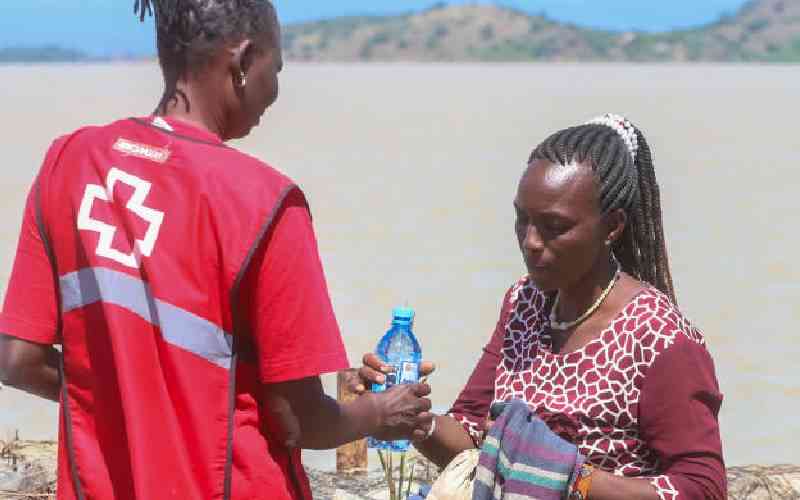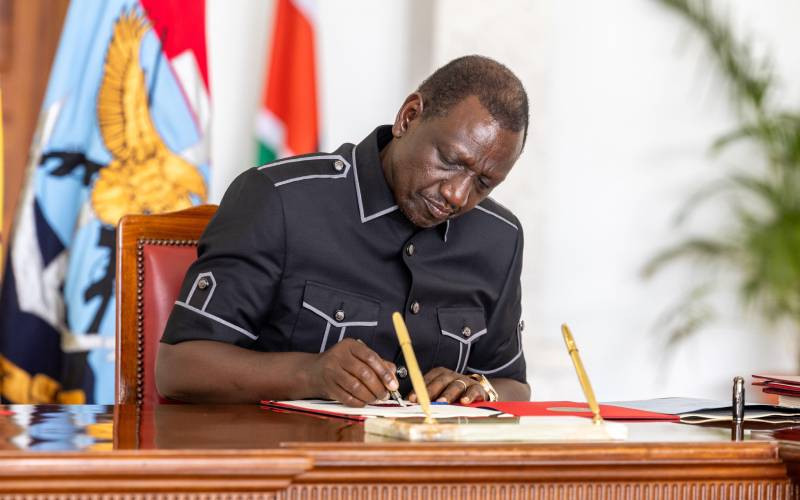Kenya: Three Jubilee senators broke ranks with their colleagues to vote out the Mutahi Kagwe committee report proposing to impeach Machakos Deputy Governor Bernard Kiala a week ago.
Hansard recordings of the vote preceded by an evening of drama show that Deputy Majority Leader Charles Keter (URP, Kericho), Kipchumba Murkomen (URP, Elgeyo Marakwet) and Peter Mositet (TNA, Kajiado) voted to reject the two impeachment charges upheld by Kagwe’s committee.
Before the vote, the debate had assumed a CORD versus Jubilee pattern with all but one CORD senator opposing it and all Jubilee senators who contributed supporting it. It has since emerged that Jubilee Chief Whip Beatrice Elachi, who called for postponement of the vote, did not eventually return to vote when Speaker Ekwe Ethuro gave her one hour opportunity to whip more senators back into the chamber.
Keter’s boss - Kindiki Kithure supported the impeachment but was nowhere when the vote was called. Only senators Abdi Bule (Tana River), Mike Mbuvi (Nairobi), Kennedy Mong’are (Nyamira), Kimani Wamatangi (Kiambu), James Mungai (Nakuru) and chair Kagwe staked out for the impeachment report in the vote.
Two other Jubilee senators, GG Kariuki and Muriuki Karue opted to abstain from the vote in which 17 senators opposed and carried the day. Of the 24 specific charges brought against Kiala by the County Assembly of Machakos, Kagwe’s committee only upheld three.
The three were related to use of the term “nguu” as translated by the Principal Legal Counsel of the County Assembly of Machakos, an interested party.
“The utterances had begun to stir up ethnic hatred and tensions in the county. The committee therefore found that the statements were in gross violation of the NCIC Act, in particular section 3 on ethnic discrimination, section 6 on harassment on the basis of ethnicity and section 13 on hate speech,” Kagwe’s committee said.
In moving the Motion, Kagwe compared the utterances of Kiala to utterances made by Adolf Hitler before the holocaust. He also drew references to use of the words to Rwandan and former Yugoslavia genocides, parallels contested as “irrelevant” by opposers.
Hassan Omar (Mombasa), a member of the committee led onslaught against the report. He described the charges as “sheer trivialities” and accused committee of failing the Senate on its duty to conduct a proper trial on Kiala.
Senate on trial
“If you were to conduct a genuine trial, look at what the Committee on Governor Wambora did; it called the Auditor General and it called the Public Procurement Oversight Authority. We called no expert, we relied on transcripts and we do not know who translated them,” Omar said.
Several senators, among them Minority Leader Moses Wetang’ula and Mr Murkomen said it was actually the Senate on trial in the Kiala matter. Wetang’ula said the “case of Machakos is an open page.”
Said Mr Wetang’ula: “I talked to one of the distinguished Members of the Committee and he told me what was on trial did not turn out to be whether the Deputy Governor should be impeached but the exposition of the rot that is Machakos County.”
Murkomen said the evidence provided to the Senate ought to be “convincing enough”. The chair of the devolution committee defended Kiala on calls to give more jobs to Machakos residents, saying that is what people voted for when they endorsed devolution. He expressed “shock” at seeing the committee coming to the plenary divided.
Stay informed. Subscribe to our newsletter
The committee’s vice chair Agnes Zani informed the Senate that in several instances, the term “nguu” appeared to have been used in reference to singular person: “In that context, nguu cannot refer to the public or anybody else, but an individual or a specific person.
All these references made to nguu, it is within a particular context and referring to particular people and never did you find any evidence that it actually refers to a specific public.”
Otieno Kajwang’ contested whether by violating the NCIC Act, Kiala had “grossly violated the Constitution.” He said any violation of the Constitution cannot amount to “gross” violation.
“You cannot grossly violate an Act of Parliament; you can only violate a section of an Act of Parliament,” he said. Kajwang said hate speech cannot be directed at a person, but rather a community.
Anyang’ Nyong’o (Kisumu) was categorical that the matter had prematurely been brought to the Senate. He said the County Executive of Machakos had “outsourced” its problem to the County Assembly of Machakos and by extension to the Senate.
Boni Khalwale, who has chaired a similar committee in the past, slighted the evidence relied by Kagwe’s committee, saying most of it was not authenticated by purported sources or independent authorities.
“If anything, this Deputy Governor should be equated to the character in the book called The Enemy of the People by Henrik Ibsen where this man was the only man remaining standing in a corrupt local authority in England,” Khalwale said.
In the midst of it all, Mutula Kilonzo Junior (Makueni) invited Senate to visit his late father’s Maanzoni Ranch conservancy in Machakos to see over 300 nguus. He claimed he was “appalled by the references given to the word nguu.
“So that, then, any references derogatory or otherwise would give those nice, beautiful animals called nguu in Kikamba, that we keep at Maanzoni Ranch, a different meaning,” he said.
He said he was “extremely concerned” about how the committee determined the allegations of hate-speech. He said the rationale for determining was missing from Kagwe’s committee and there was no demonstration of prevalence of tension in Machakos owing to Kiala’s utterances.
 The Standard Group Plc is a
multi-media organization with investments in media platforms spanning newspaper
print operations, television, radio broadcasting, digital and online services. The
Standard Group is recognized as a leading multi-media house in Kenya with a key
influence in matters of national and international interest.
The Standard Group Plc is a
multi-media organization with investments in media platforms spanning newspaper
print operations, television, radio broadcasting, digital and online services. The
Standard Group is recognized as a leading multi-media house in Kenya with a key
influence in matters of national and international interest.
 The Standard Group Plc is a
multi-media organization with investments in media platforms spanning newspaper
print operations, television, radio broadcasting, digital and online services. The
Standard Group is recognized as a leading multi-media house in Kenya with a key
influence in matters of national and international interest.
The Standard Group Plc is a
multi-media organization with investments in media platforms spanning newspaper
print operations, television, radio broadcasting, digital and online services. The
Standard Group is recognized as a leading multi-media house in Kenya with a key
influence in matters of national and international interest.







